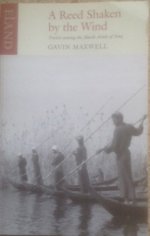A Reed Shaken By The Wind

By Alan Russell
- 1468 reads
This book was first published in 1957 following his journey through the marshes of southern Iraq with Wilfred Thesiger in 1956.
In Gavin Maxwell’s words from the ‘Author’s Note’ he described the book as ‘the story of a journey through an almost unknown land’ that lay in isolation and sharp contrast to the high rise grey westernised concrete buildings funded by oil money that he flew over on his final approach to Baghdad.
For the sake of geography the marshes are in deep southern Iraq. They reach from just north of Basra northwards towards the towns of Amara and Al Halfaya. They were about 80 miles wide and about 90 miles long. I used the past tense deliberately as Saddam Hussein made a serious effort to destroy this natural area just after the first Iraq war as reprisal against the marsh people for opposing his regime.
This is a story of adventure, of travel, of hunting and being hunted by wild pig. It is a record of a way of life that at the time of writing the book was largely untainted by the excesses of western influence. The marsh people had herds of water buffalo bred purely for their droppings which were used as fuel and coatings for the reed built houses. They fished, grew crops and moved around the marshes according to seasons much as if they were the water borne equivalent of the Bedouin.
The book is full of descriptions and observations of nature. Flocks of waterfowl that lived there permanently or used the area as a stopover during their migrations. Of how marsh families all had wooden treasure chests that contained their most valuable items such as jewellery and tokens to ward off sickness. And sadly, how the dish dash was being swopped for the overalls of oil rig workers.
Having read this book I am not surprised that the marsh people survived Saddam Hussein’s attempt at genocide by chemical warfare and draining the marshes. Since the 1990’s the marshes have been recovering but the way of life for the people will probably never be the same again.
Despite spending so much time with Wilfred Thesiger Gavin Maxwell admits that he never really got to know the man. He even thought he was quite hard which you would have to be to cope with returning to that environment voluntarily on a regular basis.
Towards the end of their journeys through the marshes Gavin Maxwell adopted an otter kitten which he and the canoe boys became very attached to. Sadly the kitten died on the last day of the journey when both men returned to Basra. Thesiger to go on and travel across the hinterland straddling the Iraq and Iran border. Maxwell waited in Basra for his mail to arrive at the British Embassy. When it did eventually arrive he went to collect it and next to bundle of letters was a hessian sack moving round on the floor. Inside was an otter kitten that Thesiger had obtained as gift for Maxwell.
Maxwell returned home to his native Scotland where he lived with his Iraqi otter and made a study of the behaviour of wild otters. Just in case his name is beginning to ring bells with you, Gavin Maxwell wrote ‘Ring of Bright Water’.
Published by Eland Publishing Limited @ £12.99 (ISBN 978 0 90787193 4)
- Log in to post comments
Comments
Interesting review,
Interesting review, particularly with Saddam Hussain's attack on them in mind. So their lifestyle has not really survived, but they are adapting?
- Log in to post comments


